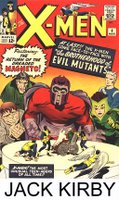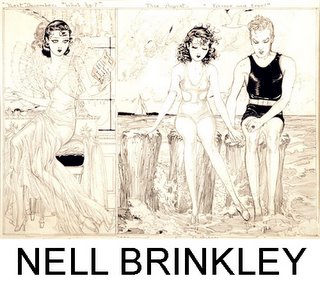
I read this article the other day. The title naturally caught my eye. The author of the article seeks to understand why no women comic book artists have been featured in an exhibit called "Masters of American Comics" in Los Angeles. The exhibit will begin display this month at the Museum of Contemporary Art and the University of California's Hammer Museum.
The author of this article, Carly Berwick, explores three possibilities: Women not having the support, the overall role of women in the culture
 in the past, and the different tastes in the content of comics between men and women. Berwick cites writer Linda Nochlin in her essay, "Why Have There Been No Great Women Artists?" who says that "True female genius...had been curtailed by social conditions--the "overwhelming odds" against it--for want, as Virginia Woolf so succinctly put it, a room of one's own: a studio, some time, a helpmate, some ready admiration, all the factors that helped Pollock be Pollock and Picasso be Picasso." There is probably a great deal of truth to this statement. I know on a personal level, I have a supportive partner who u
in the past, and the different tastes in the content of comics between men and women. Berwick cites writer Linda Nochlin in her essay, "Why Have There Been No Great Women Artists?" who says that "True female genius...had been curtailed by social conditions--the "overwhelming odds" against it--for want, as Virginia Woolf so succinctly put it, a room of one's own: a studio, some time, a helpmate, some ready admiration, all the factors that helped Pollock be Pollock and Picasso be Picasso." There is probably a great deal of truth to this statement. I know on a personal level, I have a supportive partner who u nderstands my non-reproductive creative urges and I have no children. A lot of women have children, not-so-supportive partners, and are often the caretakers of aged parents and parents-in-law (around 70% of caretakers of the aged are female). So, women have a lot of obligations often and have to meet the needs of a variety of people, traditionally. All this caretaking drains energy and art-making takes a lot of energy. And, perhaps, traditionally, the male "masters" saw female "masters" more as mistresses and those mistresses allowed themselves to be treated thusly.
nderstands my non-reproductive creative urges and I have no children. A lot of women have children, not-so-supportive partners, and are often the caretakers of aged parents and parents-in-law (around 70% of caretakers of the aged are female). So, women have a lot of obligations often and have to meet the needs of a variety of people, traditionally. All this caretaking drains energy and art-making takes a lot of energy. And, perhaps, traditionally, the male "masters" saw female "masters" more as mistresses and those mistresses allowed themselves to be treated thusly.
The traditional roles of women began to change in the 1970s and women began to flood into the labor and creative markets. The roles listed in the preceding paragraph are now optional and women aren't as "trapped" as we perceived them to be in the past. Having children is optional and a woman is not labeled "barren." She can choose to have a partner or not and does not become an old maid, spinster, or
 pariah for choosing not to. A woman now has almost the same earning power as a single man (well, about 76 cents on the dollar) and can support her own art habit. Men are also experiencing a change in their mindsets about what it means to be a supportive partner. They are tossing aside the antiquated idea of the "king of the castle" that fathers and husbands had in the past and being more cooperative and contributing directly to the rearing of children in terms of personal interactions and not merely breadwinners.
pariah for choosing not to. A woman now has almost the same earning power as a single man (well, about 76 cents on the dollar) and can support her own art habit. Men are also experiencing a change in their mindsets about what it means to be a supportive partner. They are tossing aside the antiquated idea of the "king of the castle" that fathers and husbands had in the past and being more cooperative and contributing directly to the rearing of children in terms of personal interactions and not merely breadwinners.In Berwick's article, New Yorker cartoonist Roz Chast states, "I think
 women--in general--like comics that are more verbal and personal and perhaps, more based in everyday experience." "Artbabe" and "La Perdida" creator Jessica Abel states that "Shoju, girls' manga, is structured like sitcoms....It's funny, light, and really appealing to a 12-year-old girl. That's all anybody was trying to get across all those years when people were discussing why girls weren't reading comics." Berwick also states, "the appeal of "male" comics to women--and of "women's" comics to male readers--was limited until
women--in general--like comics that are more verbal and personal and perhaps, more based in everyday experience." "Artbabe" and "La Perdida" creator Jessica Abel states that "Shoju, girls' manga, is structured like sitcoms....It's funny, light, and really appealing to a 12-year-old girl. That's all anybody was trying to get across all those years when people were discussing why girls weren't reading comics." Berwick also states, "the appeal of "male" comics to women--and of "women's" comics to male readers--was limited until  the genre began to evolve beyond such distinctions, becoming more narrative and more focused on recognizable realities and emotions than on fantasies about spaceships and superheroes." The difference between men and women in terms of taste in content of comic books is an interesting justification for the lack of "master" female comic artists. Do women and girls really prefer "verbal," "personal," "sitcom-like," "narrative," and "realistic" content in their comics? Can that really be generalized? Why are male tastes considered the standard while female tastes are considered the deviation? Does this mean that men and boys prefer "stoic," "impersonal," "epic-like," "non-narrative," and more "fantastic" content? If so, why? Why do a lot of male created comics often include the theme of fantastic heroism?
the genre began to evolve beyond such distinctions, becoming more narrative and more focused on recognizable realities and emotions than on fantasies about spaceships and superheroes." The difference between men and women in terms of taste in content of comic books is an interesting justification for the lack of "master" female comic artists. Do women and girls really prefer "verbal," "personal," "sitcom-like," "narrative," and "realistic" content in their comics? Can that really be generalized? Why are male tastes considered the standard while female tastes are considered the deviation? Does this mean that men and boys prefer "stoic," "impersonal," "epic-like," "non-narrative," and more "fantastic" content? If so, why? Why do a lot of male created comics often include the theme of fantastic heroism?These are all intriguing questions. To be sure, the answers are more complicated than "women have been kept down by men." What do you think? Why are women under-represented in the world of comics?



No comments:
Post a Comment